Exploring Tokyo’s Kitchenware Capital: Kappabashi Walking Tour
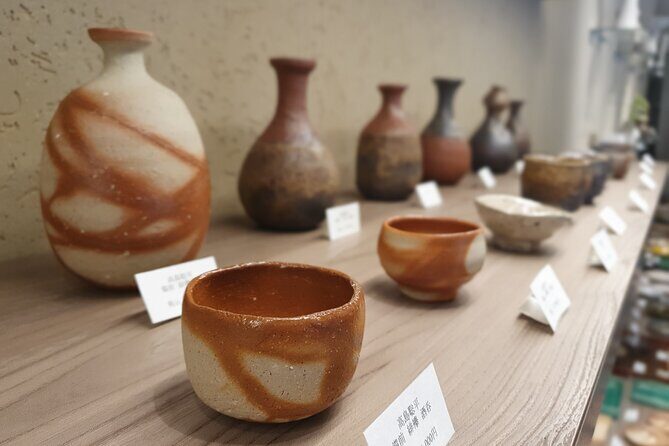
If you’re a fan of Japanese cuisine or simply curious about the tools behind some of the world’s most renowned culinary traditions, a tour of Kappabashi in Tokyo is an eye-opening experience. For just under $78, you’ll spend approximately three to four hours wandering through this bustling district, discovering everything from handmade knives to traditional ceramics. Your guide, often praised for their local knowledge and friendly approach, will bring the streets to life with stories and insights, making it more than just a shopping trip.
What we love most about this experience is its focus on authentic craftsmanship — whether it’s the hand-forged knives or the beautifully crafted ceramics. The tour is also well-paced, allowing you to enjoy each shop without feeling rushed, and the small group size means plenty of personalized attention. One potential consideration is that if you’re not especially interested in cooking or kitchen gadgets, some stops might feel niche. But for food lovers, chefs, or those eager to understand Japanese culinary culture, this walk is a treasure trove.
This tour suits anyone who appreciates hands-on experiences and wants to see the real Tokyo behind its famous food scene. It’s perfect for curious travelers, amateur cooks, or collectors of unique crafts. Given the high praise for guides who blend knowledge with warmth, it’s an activity that promises both education and enjoyment.
Key Points
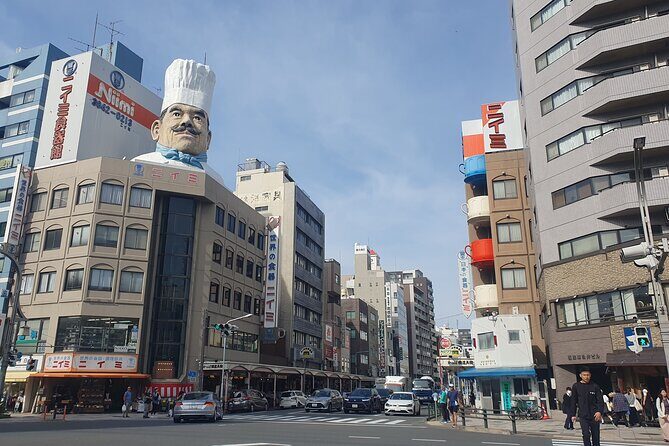
- Authentic craftsmanship: Discover handmade knives, ceramics, and glassware crafted by Japanese artisans.
- Local insights: Guides share stories behind each craft, enriching your understanding of Japan’s culinary culture.
- Varied stops: From pottery shops to sake tastings, the itinerary offers a well-rounded look at kitchenware.
- Value for money: At $77.67, you get an engaging experience led by knowledgeable guides, with many stops free to explore.
- Limited group size: Small groups (max 8) ensure personalized interaction and a comfortable pace.
- Cultural highlights: Besides shopping, learn about Japan’s food sample culture and traditional crafts.
If you're drawn to exploring Tokyo on foot, we've looked into these other walking experiences
A Deep Dive into the Kappabashi Experience

Walking into the districts of Kappabashi, often called the “Kitchen Town” of Tokyo, you’re immediately immersed in a world of culinary tools that seem almost art objects. The tour offers a curated journey through some of the most interesting shops, each with its own character and specialties. It’s a perfect way to see a side of Tokyo that’s usually hidden behind restaurant kitchens or tourist-packed streets.
Dengama: The Ceramic Wonderland
Our first stop, Dengama, is a classic Japanese ceramics shop located right on a busy intersection. The shop brims with everyday utensils, lacquerware, chopsticks, sake vessels, and more. The second floor offers slightly more upscale tableware, making it a favorite for both locals and visitors. The owner’s choice of high-quality, diverse items gives you a glimpse into Japan’s ceramic traditions. As one reviewer notes, it’s always crowded, which speaks to its popularity and quality.
Tsuchi-ya: Glass Artistry
Next up is Tsuchi-ya, where over 35 Japanese glass artisans’ works are displayed. The standout here is the Kiriko Glasses, a traditional cut-glass technique that transforms ordinary drinking glasses into tiny works of art. The shop’s open feel and wide selection make it easy to appreciate the craftsmanship involved. We loved the way this stop combines aesthetic beauty with practical use, embodying Japan’s attention to detail.
Majimaya: The Bakers’ Paradise
For those with a sweet tooth or baking interest, Majimaya is a must-visit. With more than 400 cookie molds, it’s a baker’s heaven. The shop’s extensive display gives you ideas for making everything from traditional Japanese cookies to Western-style treats. It’s a fun, tactile experience — and an insight into Japan’s love for detailed presentation.
- Düsseldorf: Manga, mochi & more Düsseldorf’s Little Tokyo
- From Tokyo: Mt. Fuji Spanish & English Tour
- Downtown Los Angeles : Historic district & Little Tokyo
- Outdoor Escape Room in LA – Little Tokyo
- LA Little Tokyo to Olvera St Smartphone (App/GPS) Walking Tour
- 1-Day Mt Fuji and Hakone Sightseeing trip from Tokyo
Ganso Food Sample Shop: The Art of Plastic Food
One of Japan’s most distinctive cultural exports is plastic food samples. At the Ganso Food Sample Shop, you can get up close to these handmade displays, which are used in restaurant windows worldwide. They’re not only practical but also collectors’ items. Many visitors find this stop fascinating — as one reviewer says, it’s a chance to see these miniature masterpieces up close and even buy souvenirs.
Musashi Japan: Knives and Sake
A highlight for many is Musashi, a 250-year-old blacksmithing shop specializing in Japanese knives. Every knife is handmade, and you’ll get to feel how they fit in your hand and test their sharpness. Whether you prefer traditional chef knives, gold-carved Chokin Knives, or the eco-friendly Tsushima knives made from marine plastic, this shop caters to all tastes.
On the second floor, you can relax and sample some of Japan’s finest sake. This pairing of culinary tools and drink adds depth to the experience, allowing you to savor a little of the culture behind each product.
Utsuwa Maesaka: Elegant Pottery and Glassware
This shop offers high-quality, sophisticated tableware with unique designs. Its gallery-like storefront attracts attention from passersby, and the items on display range from the luxurious to the more budget-friendly. This stop is ideal for those interested in Japanese aesthetics and craftsmanship.
Seikyodo: Artisanal Crafts and Culture
Seikyodo combines ceramics, lifestyle goods, and handmade clothing. The owners travel across Japan to find unique, artisan-made items. They also host workshops like traditional bookmark making, giving you a chance to engage directly with Japanese craft traditions. Keep in mind, the shop is closed on Sundays, Mondays, and Wednesdays.
I Fuji: Wooden Boxes and Cultural Objects
Finally, I Fuji the box tailor is a small, family-run shop dedicated to handmade wooden objects, especially their famous boxes. The shop promotes a simple, sustainable lifestyle and offers beautifully crafted, functional art pieces. It’s a quiet, contemplative ending to a busy tour — perfect for those who appreciate craftsmanship for its beauty and utility.
The Real Value of the Tour
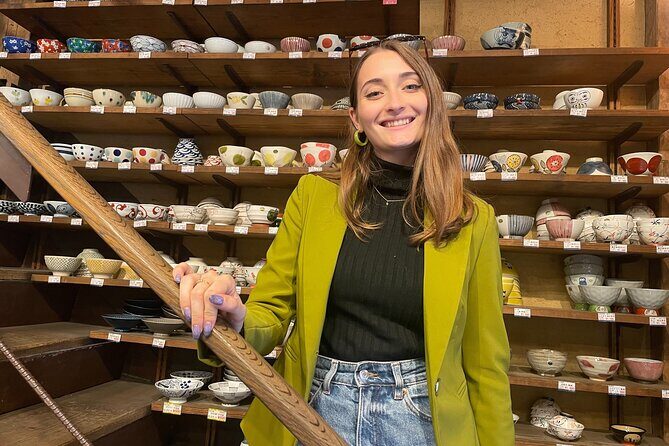
Beyond just shopping, this tour offers a glimpse into Japanese culture and craftsmanship, often overlooked by typical tourist routes. Your guide’s insights help you understand the significance of each craft, from the traditional techniques used to forge knives to the story behind food samples. Several reviews highlight how knowledgeable guides like Michiko and Yuki make the tour memorable, blending local lore with practical info.
While the price of about $77 is modest considering the number of stops and the small group size, the tour’s strength lies in its attention to detail and personalized experience. Most stops are free to explore, and the shops offer a variety of souvenirs, making it a good value for those wanting a cultural snapshot rather than just retail therapy.
The tour’s duration of 3 to 4 hours is well-judged — long enough to give you a thorough look but not so long that it becomes tiring. The small group size enhances interaction, allowing you to ask questions, see demonstrations, and really get a sense of Japanese craftsmanship.
Who Should Consider This Tour?
This experience is ideal for food lovers, chefs, craft enthusiasts, and travelers who enjoy hands-on cultural activities. If you’re curious about the tools and aesthetics behind Japan’s culinary scene, this tour will deepen your understanding and appreciation. It also makes a perfect addition to a broader Tokyo itinerary, especially for those interested in local artisan culture.
Keep in mind, it’s best suited for those with some interest in cooking or Japanese crafts — the shops and items can be very niche, and some stops may not appeal if you’re not into kitchenware or ceramics. However, the reviews suggest that guides do a good job of engaging all kinds of travelers, making the experience approachable for everyone.
Practical Tips
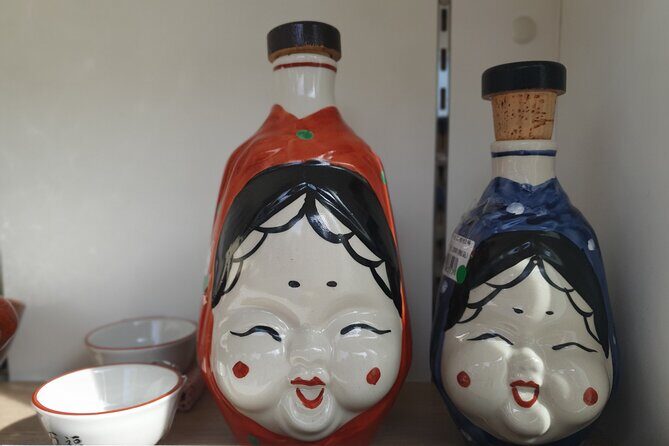
- Book well in advance — on average, the tour is booked 32 days ahead.
- Arrive at Tawaramachi Station — the meeting point is central and accessible.
- Wear comfortable shoes — as you’ll be walking and standing quite a bit.
- Bring a small bag or backpack — to carry any souvenirs or samples you might purchase.
- Optional workshops — like food sample making or bookmark crafting, require advance booking and incur additional fees.
- Consider supplementing with a visit to nearby Asakusa or a traditional sushi lunch afterward for a complete cultural experience.
Frequently Asked Questions
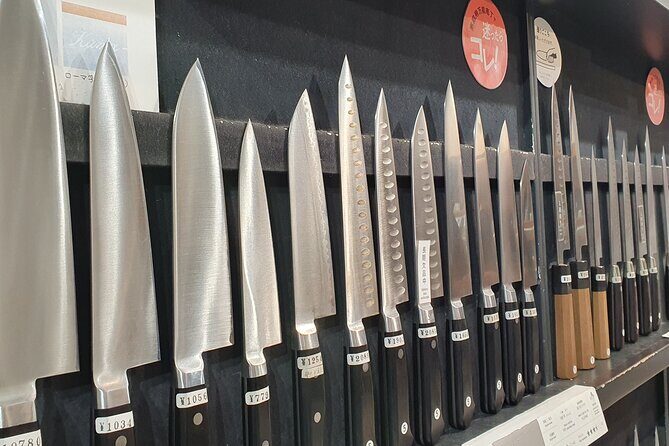
Is this tour suitable for children?
Most travelers can participate, but it’s best suited for those interested in crafts or food culture. Young children might find some stops less engaging unless they share an enthusiasm for kitchenware.
Are there any vegetarian or dietary considerations?
The tour focuses on tools and crafts, so food isn’t a core part of it. You might want to explore local eateries separately for meals.
Is the tour suitable for people with mobility issues?
The tour involves walking and some shop visits that may include stairs or narrow aisles. Check with the provider if you have specific mobility concerns.
How much shopping can I do during the tour?
Several stops, like Dengama and Tsuchi-ya, are primarily for browsing, but there’s ample opportunity to purchase unique items.
Can I join the tour without booking workshops?
Yes, workshops are optional and require separate booking and fees.
What is included in the price?
A knowledgeable guide, all taxes, and the experience of visiting multiple handmade crafts and shops.
Are there any meals included?
No, lunch or drinks are not included, but you can purchase snacks or beverages during the tour.
What’s the best way to get to the meeting point?
It’s near public transportation at Tawaramachi Station — a convenient starting point for most travelers.
How long is the typical tour?
Approximately 3 to 4 hours, depending on the group and pace.
What should I bring?
Comfortable shoes, a small bag for souvenirs, and curiosity about Japanese craftsmanship.
Final Thoughts
This Kappabashi Walking Tour offers a rare peek into Japan’s culinary craftsmanship, blending sightseeing with cultural education. For those intrigued by Japanese food culture, traditional crafts, and authentic artisanal shops, it’s a rewarding experience that can deepen your appreciation for Japan’s culinary scene.
The guides truly enhance the experience with their local knowledge and friendly approach, making the busy streets of Kappabashi feel both welcoming and inspiring. Whether you’re a chef-to-be, a craft collector, or simply someone who loves discovering local culture, this tour is a compelling way to spend a few hours in Tokyo’s culinary heart.
In short, it’s a hands-on, well-curated journey that balances learning and entertainment. If you want to see the tools that help craft Japan’s world-famous cuisine, and learn about their stories, this tour has plenty to offer.
Happy exploring, and may your kitchen adventures in Japan be as beautiful and precise as the crafts you’ll see in Kappabashi.
More Walking Tours in Tokyo
- Nihonbashi Walking Tour Through Japanese Craftsmanship
- Private Walking Tour in Tokyo – Perfect for First-Time Visitors
- Full Day Walking Tour in Shinjuku and Shibuya
- Sacred Morning Walk and Brunch Meiji Shrine
- Tokyo Tsukiji Fish Market Food and Culture Walking Tour
- The Old Quarter of Tokyo – Yanaka Walking Tour
More Tours in Tokyo
More Tour Reviews in Tokyo
More Tokyo experiences we've covered
- Private Tokyo Local Food and Drink Tour with a Bar Hopping Master
- Tokyo Ghost Tour Through Haunting Japanese Legends
- JDM Experience with Fast&Furious RX-7 Tour
- Retro Game Treasure Discovery Tour
- TOKYO Ultimate Samurai Armor Photo Experience!
- Private Narita International Airport Transfers (NRT) for Tokyo 23 wards
- Tokyo Tower Japan Admission Ticket
- 50 mins City lights HelicopterTour: Tokyo and Yokohama plan
- Flexible Yokohama Tour, Send to Tokyo, Haneda, or Narita
- Tsukiji Fish Market Private Food Tour in Tokyo
- Tokyo: Traditional Tea Ceremony with a Japanese Tea Master
- Nihonbashi Walking Tour Through Japanese Craftsmanship
